|
Books
Social Movements, Mobilization, and Contestation in the Middle East and North Africa; co-edited with Frédéric Vairel (Stanford University Press, 2011)
 coming in May coming in May
The Struggle for Worker Rights in Egypt (Solidarity Center, 2010); Arabic translation Solidarity Center, 2010.
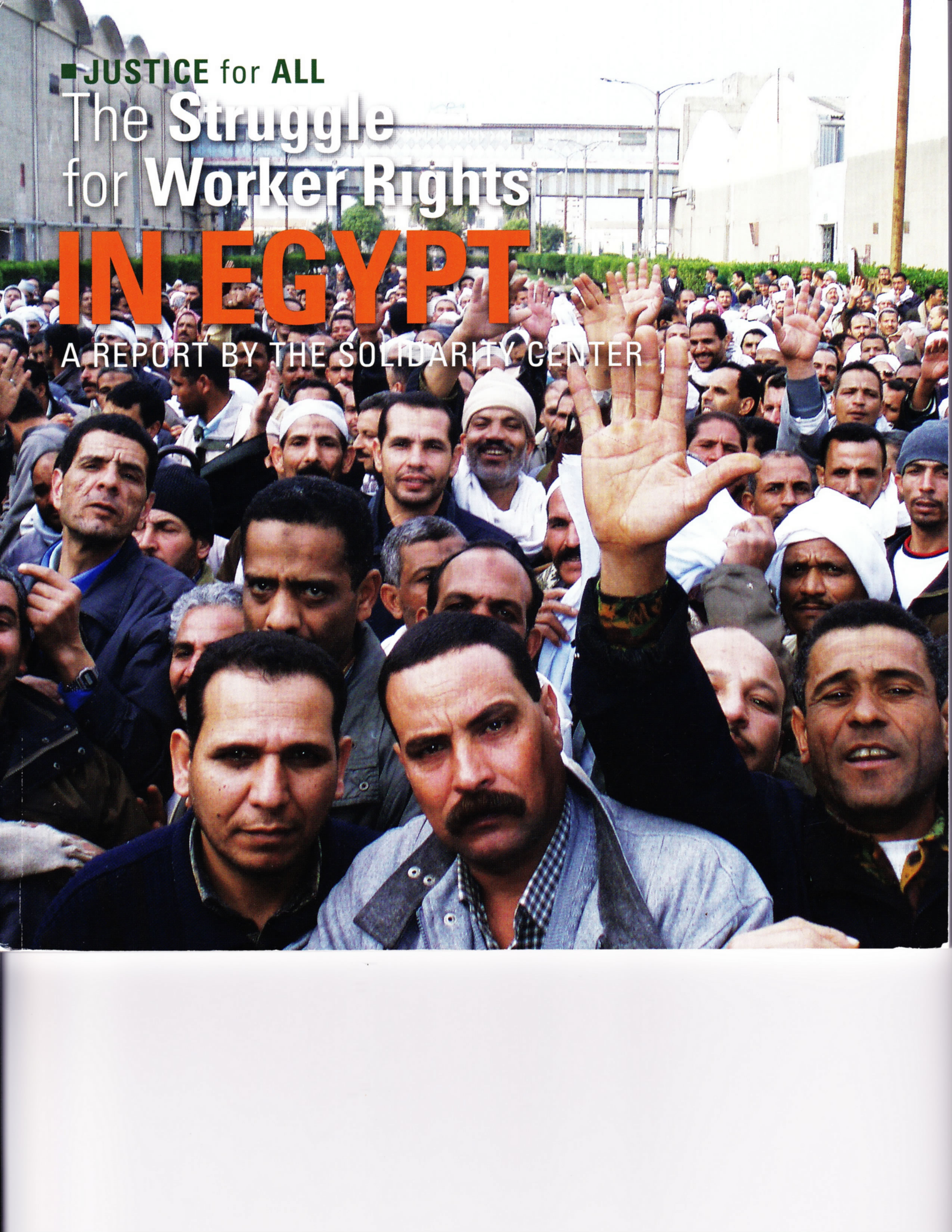
The Struggle for Sovereignty: Palestine and Israel, 1993-2005 (Stanford University Press, 2006); co-edited with Rebecca L. Stein
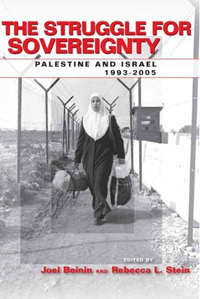 After the 1993 Oslo Accords people across the world anticipated the onset of peace and an end to the Palestinian-Israeli conflict. For Israelis, the Accords generated massive economic growth and a sense of security. For Palestinians in the West Bank and the Gaza Strip, they led to a dramatic rise in poverty and unemployment due to a complex array of closures, militarized checkpoints, and bypass roads, and a vast expansion of the settlement project that fractured Palestinian territories and communities. In 2000 popular Palestinian rage with the new shape of the Israeli occupation erupted in a second uprising or intifada.
After the 1993 Oslo Accords people across the world anticipated the onset of peace and an end to the Palestinian-Israeli conflict. For Israelis, the Accords generated massive economic growth and a sense of security. For Palestinians in the West Bank and the Gaza Strip, they led to a dramatic rise in poverty and unemployment due to a complex array of closures, militarized checkpoints, and bypass roads, and a vast expansion of the settlement project that fractured Palestinian territories and communities. In 2000 popular Palestinian rage with the new shape of the Israeli occupation erupted in a second uprising or intifada.
In this volume, prominent scholars and journalists examine the dramatic political changes in Palestine and Israel from the Oslo Accords through the second intifada and the death of Yasser Arafat. Their essays address the political economy of the Oslo process, social and political changes in Palestine and Israel, United States foreign policy, social movements and political activism, and the interplay between cultural and political-economic processes. The volume also includes documents, maps, poetry, and graphic art.
Workers and Peasants in the Modern Middle East (Cambridge University Press, 2001)
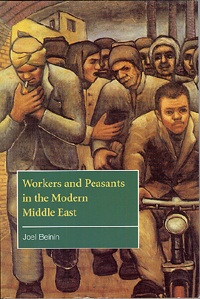 The working people, who constitute the majority in any society, can be and deserve to be subjects of history. This survey of subaltern history in the Middle East demonstrates lucidly and compellingly how their lives, experiences, and culture can inform our historica lunderstanding. Beginning in the middle of the eighteenth century, the book charts the histopry of peasants, urban artisans, and modern working classes across the lands of the Ottoman Empire and its Muslim-majority successor-states, including the Balkans, Turkey, the Arab Middle East, and North Africa. Inspired by the Indian Subaltern Studies school, the book is the first to present a synthetic critical assessment of the scholarly work on the social history of this region for the last twenty years. The working people, who constitute the majority in any society, can be and deserve to be subjects of history. This survey of subaltern history in the Middle East demonstrates lucidly and compellingly how their lives, experiences, and culture can inform our historica lunderstanding. Beginning in the middle of the eighteenth century, the book charts the histopry of peasants, urban artisans, and modern working classes across the lands of the Ottoman Empire and its Muslim-majority successor-states, including the Balkans, Turkey, the Arab Middle East, and North Africa. Inspired by the Indian Subaltern Studies school, the book is the first to present a synthetic critical assessment of the scholarly work on the social history of this region for the last twenty years.
The Dispersion of Egyptian Jewry: Culture, Politics, and the Formation of a Modern Diaspora (University of California Press, 1998); Arabic translation, Cairo: Dar al-Shuruq, 2007
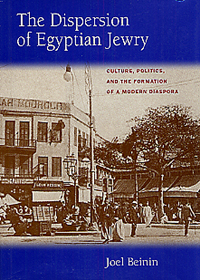 Egypt’s indigenous Jewish population comprised Arabic-speaking Rabbanite and Karaite Jews, some of whom had been in the country since the early Islamic era. The Jews expelled from Spain in 1492 took refuge in Egypt, and Sephardic immigrants augmented their numbers in the midnineteenth century. Originally welcomed elsewhere in the Ottoman Empire, these Spanish Jews came to Egypt seeking economic opportunity in the era of Suez Canal construction and the cotton boom. The late nineteenth century brought Ashkenazi Jews fleeing persecution in Eastern Europe. The different groups formed a heterogeneous community of cosmopolitan hybrids, which were both an element of strength and a factor in its eventual demise.
Egypt’s indigenous Jewish population comprised Arabic-speaking Rabbanite and Karaite Jews, some of whom had been in the country since the early Islamic era. The Jews expelled from Spain in 1492 took refuge in Egypt, and Sephardic immigrants augmented their numbers in the midnineteenth century. Originally welcomed elsewhere in the Ottoman Empire, these Spanish Jews came to Egypt seeking economic opportunity in the era of Suez Canal construction and the cotton boom. The late nineteenth century brought Ashkenazi Jews fleeing persecution in Eastern Europe. The different groups formed a heterogeneous community of cosmopolitan hybrids, which were both an element of strength and a factor in its eventual demise.
The Dispersion of Egyptian Jewry examines the history of the Egyptian Jewish community after 1948. It focuses on three major areas: the life of the majority of the community, which remained in Egypt from the1948 Arab-Israeli War until the aftermath of the 1956 Suez/Sinai War; the dispersion and reestablishment of Egyptian Jewish communities in the United States, France, and Israel; and contested memories of Jewish life in Egypt since President Anwar al-Sadat’s visit to Jerusalem in 1977. Fusing history, ethnography, literary analysis, and autobiography, Joel Beinin conducts an interdisciplinary investigation into identity, dispersion, and the retrieval of identity that is relevant for anyone interested in Egypt, the Jewish Diaspora, or the formation of cultures and identities.
Political Islam: Essays from Middle East Report (University of California Press, 1996); co-edited with Joe Stork
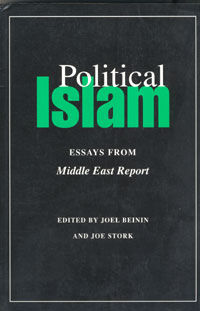 The essays and case studies collected here--featuring some of the best material from Middle East Report over the past decade as well as much original material--challenge the facile generalizations about what Western media and political establishments usually call "Islamic fundamentalism." The authors demonstrate the complexity of these movements and offer complementary and contrasting interpretations of their origins and significance. The material included covers a broad range of themes--including democracy and civil society, gender relations and popular culture--as they have emerged in countries throughout the Middle East and North Africa.
The essays and case studies collected here--featuring some of the best material from Middle East Report over the past decade as well as much original material--challenge the facile generalizations about what Western media and political establishments usually call "Islamic fundamentalism." The authors demonstrate the complexity of these movements and offer complementary and contrasting interpretations of their origins and significance. The material included covers a broad range of themes--including democracy and civil society, gender relations and popular culture--as they have emerged in countries throughout the Middle East and North Africa.
Was the Red Flag Flying There? Marxist Politics and the Arab-Israeli Conflict in Egypt and Israel, 1948-1965 (University of California Press, 1990). Arabic translation: al-`Alam al-ahmar: hal kana yurafrif hunak? al-siyasat al-markisiyya wa'l-niza` al-`arabi al-isra'ili (Cairo: Dar al-Thaqafa al-Jadida, 1996)
 How did the proposal to partition Palestine into an Arab and a Jewish state -- a solution endorsed by international consensus in 1947-49 -- become and obscure and even unthinkable option by the mid-1960s? As the most consistent advocates of this two-state solution the Marxist parties in Egypt and Israel -- The Communist Party of Egypt, The Communist Party of Israel (MAKI), and the United Workers Party of Israel(MAPAM), which attempted, but ultimately failed to sustain a dual commitment to Marxism and Zionism -- constitute the focal point of this analysis. The failure of these movements and the progressive abandonment of an internationalist orientation toward resolving the Arab-Israeli conflict is explained as a consequence of the hegemony of nationalist politics in both Egypt and Israel. How did the proposal to partition Palestine into an Arab and a Jewish state -- a solution endorsed by international consensus in 1947-49 -- become and obscure and even unthinkable option by the mid-1960s? As the most consistent advocates of this two-state solution the Marxist parties in Egypt and Israel -- The Communist Party of Egypt, The Communist Party of Israel (MAKI), and the United Workers Party of Israel(MAPAM), which attempted, but ultimately failed to sustain a dual commitment to Marxism and Zionism -- constitute the focal point of this analysis. The failure of these movements and the progressive abandonment of an internationalist orientation toward resolving the Arab-Israeli conflict is explained as a consequence of the hegemony of nationalist politics in both Egypt and Israel.
Intifada: The Palestinian Uprising Against Israeli Occupation (South End Press, 1989); co-edited with Zachary Lockman
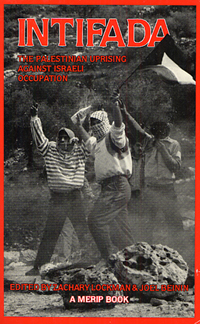
Workers on the Nile: Nationalism, Communism, Islam and the Egyptian Working Class, 1882-1954 (Princeton University Press, 1987); co-authored with Zachary Lockman. Arabic translation: al-`Ummal wa'l-haraka al-siyasiyya fi misr: al-wataniyya, al-shuyu`iyya, al-islamiyya , 2 vols. (Cairo: Markaz al-Buhuth al-`Arabiyya, 1992, 1996). 2 nd edition: American University in Cairo Press (1998)
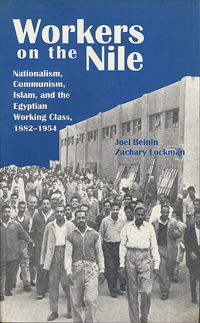 This study challenges traditional scholarship on the history of the Middle East by demonstrating the importance of the working class and of class struggle in the history of modern Egypt. It argues that class and national consciousness were interpenetrated and that the there was a close, but contradictory, relationship between the labor movement and the nationalist movement from the late nineteenth century until the consolidation of power by the regime of Jamal `Abd al-Nasir in 1954. Egyptian workers were not simply the passive followers of bourgeois nationalist notables. Rather, the growth of large-scale capitalist enterprises, particulalry in the textile industry and urban transport, created the context in which workers played an increasingly independent political role. All the major political forces -- the Wafd, the Muslim Brothers, and the communists -- competed to win the allegiance of workers and their trade unions. This study challenges traditional scholarship on the history of the Middle East by demonstrating the importance of the working class and of class struggle in the history of modern Egypt. It argues that class and national consciousness were interpenetrated and that the there was a close, but contradictory, relationship between the labor movement and the nationalist movement from the late nineteenth century until the consolidation of power by the regime of Jamal `Abd al-Nasir in 1954. Egyptian workers were not simply the passive followers of bourgeois nationalist notables. Rather, the growth of large-scale capitalist enterprises, particulalry in the textile industry and urban transport, created the context in which workers played an increasingly independent political role. All the major political forces -- the Wafd, the Muslim Brothers, and the communists -- competed to win the allegiance of workers and their trade unions.
|